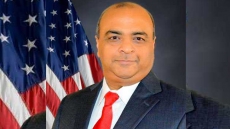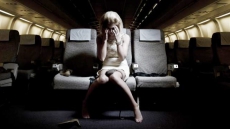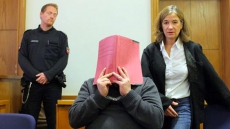VANCOUVER — Sri Lanka's defence secretary denied Tuesday that his country committed torture and rape of suspected rebels, as charged by more than 50 men of the island's Tamil ethnic minority who are seeking political asylum in Europe.
Kapila Waidyaratne called the claims of abuses "baseless and unfounded."
"The government of Sri Lanka is for zero tolerance with regard to sexual abuse and so on," Waidyaratne told The Associated Press as he attended the U.N. Peacekeeping Defence Ministerial conference in Vancouver.
The allegations came in a Nov. 8 report by the AP on the asylum seekers and their claims of being abducted and tortured by Sri Lanka's current government. The Tamils said they were raped, branded or beaten repeatedly.
The AP reviewed 32 medical and psychological evaluations and interviewed 20 men.
A U.S. State Department spokesperson said they are concerned by the allegations against Sri Lanka's security services.
"The United States condemns torture, rape, and sexual violence anywhere in the world. We welcome the Sri Lankan government's commitment to investigate these allegations, and to seek accountability for all those responsible for such abuses without delay," the official said.
The International Truth and Justice Project — Sri Lanka, which has alleged human rights violations in Sri Lanka, said it was impossible to believe the government had credibly investigated the claims in a week.
"It is precisely this cavalier approach to the justice process that leads victims to reject any domestic processes in Sri Lanka, as it frankly cannot be trusted," said the organization's executive director, Yasmin Sooka.
The men said they were accused of trying to revive a rebel group, the Liberation Tigers of Tamil Eelam or Tamil Tigers, which was on the losing side of Sri Lanka's civil war. Fighting ended eight years ago, but the torture and abuse occurred from early 2016 to as recently as this past July, the men said.
Doctors, psychologists, lawmakers and rights groups have appealed to the United Nations to investigate the new allegations.
U.S. Sen. Patrick Leahy of Vermont, the top ranking Democrat on the subcommittee that oversees U.S. foreign aid, last week called the allegations troubling and noted that the U.S. Senate Appropriations Committee has conditioned aid to Sri Lanka on its compliance with international standards for arrest and detention.
"These accounts of torture are horrific and contradict the Sri Lankan government's professed commitment to reconciliation and justice," Leahy said, adding, "I will be looking for convincing evidence that torture has ended and those responsible are being punished."

Waidyaratne said Sri Lanka's government has investigated all allegations. "The investigations that have been carried out have been concluded and closed," he said. But it wasn't clear whether he referred to the latest charges or previous cases.
The men said they were accused of working with the Tamil Tigers, which Sri Lanka has said is no longer a threat.
Nearly all of the men were branded with tiger stripes. One man had nearly 10 thick scars across his back.
Asked about the scars, Waidyaratne said, "These are sometime inflicted by a friendly hand."
He said the charges should not be judged solely on what the men say.
"The others must be given a hearing," Waidyaratne said. "This should be looked into. If there are any allegations I'm sure the government of Sri Lanka would welcome independent investigation."
Calls for such an investigation could come at a U.N. Human Rights Council meeting in Geneva on Wednesday at which the Sri Lankan situation is expected to be discussed.
There have been calls for aid to Sri Lanka to be cut off.
"This is quite unfair," Waidyaratne said. "This is not only with regard to one set of people. This is for everybody. The aid is not for one particular group of people."
While denying that torture still persists, Sri Lanka has repeatedly failed to investigate war crimes allegations stemming from its 26-year civil war with the Liberation Tigers of Tamil Eelam, who were fighting for an independent Tamil homeland on the island dominated by ethnic Sinhalese.
The rebel movement was designated a terrorist organization after a wave of suicide bombings, while government forces were accused of targeting civilians, which is considered a war crime under international law.





